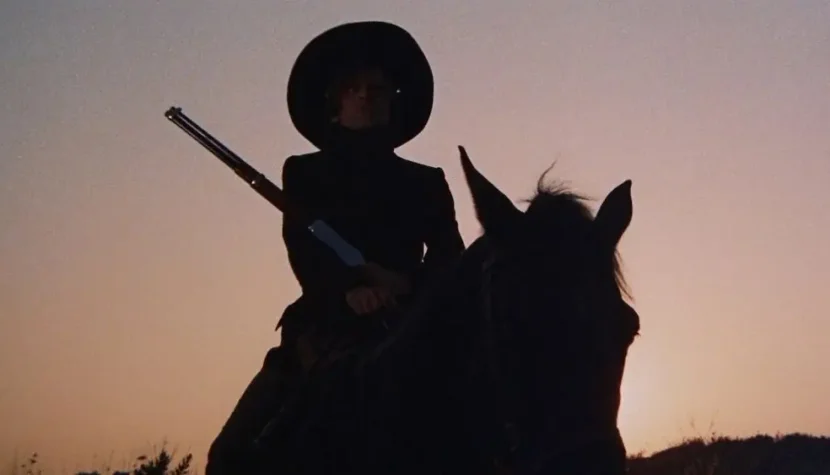AND GOD SAID TO CAIN. A spaghetti western like a gothic horror

And God Said to Cain is a remarkable example of how to tell a thoroughly conventional story in a fresh and exciting way.
Former officer Gary Hamilton is serving a prison sentence and forced labor for a gold theft he was framed for by a man named Acombar. After ten years of hard labor in the quarries, Hamilton is pardoned under an amnesty for his military service. He decides to return to his hometown to take revenge on Acombar and his former partner Mary, who betrayed him by having an affair with Acombar and then marrying him. On his way to town, Hamilton meets Dick, Acombar’s young son, and introduces himself as a friend of Acombar, instructing Dick to tell his father about their imminent meeting. Acombar first sets up an unsuccessful ambush for Hamilton and then assembles a group of mercenaries to defend his estate. As night falls, Acombar’s men are killed one by one in brutal ways, while a massive tornado approaches the town.

And God Said to Cain is a loose, unofficial adaptation of *Uno straniero a Paso Bravo* (1968) by Salvatore Rosso – the character names and numerous other details are the same in both films, and the plot also revolves around revenge. However, in Rosso’s film, the protagonist sought vengeance for the death of his wife and daughter, not a conspiracy. In the opening credits of Margheriti’s film, the screenplay is credited to Giovanni Addessi and Margheriti himself, with no mention of the scriptwriters of *Uno straniero a Paso Bravo* – Lucio Battistrada, Fernando Morandi, and Eduardo Manzanos Brochero. Is it plagiarism? To some extent, yes, although despite the similarities, Margheriti’s and Rosso’s films differ significantly, especially in terms of aesthetics. While *Uno straniero…* is a more formulaic spaghetti western, *And the Lord Said…* is an altogether unconventional western.
Margheriti, a creator of many horror films, infused Cain with elements of gothic horror. The action takes place during a dark, stormy night: wind howls like the souls of the damned through the deserted streets of the town, church bells ring in alarm, a ghostly priest plays an eerie melody on the organ, and Acombar hides in an estate resembling a grim castle, while Hamilton mercilessly takes out his henchmen, who fear him like the devil himself. Hamilton, lurking in the catacombs and shadowy corners, is like a specter – always in the darkness, always one step ahead of his enemies, seemingly invisible and immortal, as if he possesses supernatural powers. The tornado and storm give the events an apocalyptic tone, symbolizing the boundless power of the Angel of Vengeance, whose rifle he wields like death’s scythe. His revenge is total, with a nearly biblical dimension.

Hamilton is an unconventional character even by the standards of the spaghetti western genre, which is filled with morally ambiguous (anti)heroes. Innocent and justifiably motivated, yet in his blind pursuit of revenge, Hamilton is inhuman (like a ghost, indeed). Betrayed by everyone, his character has only one goal, and nothing will stop him from achieving it. On the other hand, Acombar is both a traitor and a corrupt man, but also a loving father and husband who cares for his family. As a result, Hamilton is easy to understand but difficult to root for, while Acombar’s punishment seems disproportionate to his crime. Hamilton doesn’t follow the maxim “an eye for an eye, a tooth for a tooth” – he knocks out all of his enemy’s teeth for one tooth and tears off his head for one eye. And that’s all that drives him: even the gold that Acombar betrayed him for is left behind for the townspeople.
This ambivalence, along with the ominous atmosphere, is one of Cain’s greatest assets. Casting Klaus Kinski in the lead role was also a brilliant choice. This actor appeared in nearly 140 films, most of which are unwatchable (unsurprising, given that Kinski would act in any trash for money). Apart from five films by Werner Herzog and a few other productions, the German actor rarely played lead roles, making *Cain* unique in this regard as well. However, Hamilton isn’t a madman like Fitzcarraldo or Woyzeck; this is a subtle, restrained performance, played with nuance, relying more on facial expressions and glances than on words. It’s undoubtedly one of Kinski’s best roles, and Margheriti’s film is one of the finest spaghetti westerns in the history of the genre.

